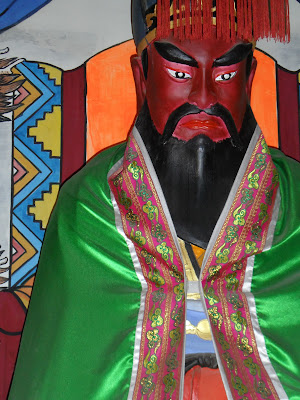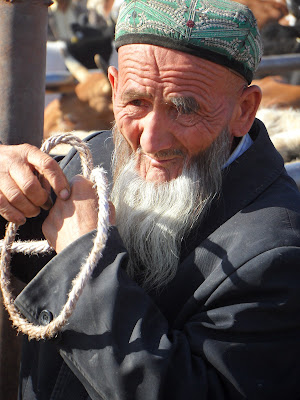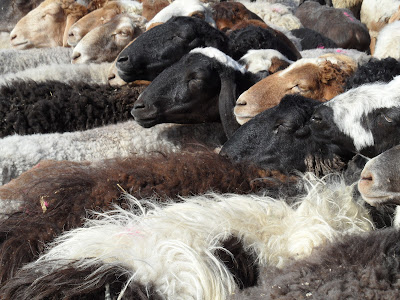Nowhere does life imitate art as splendidly as on the Trans-Siberian. As the train cuts its way through the wide open steppes, my compartment window frames a view that is pure Rothko. The pale blue of the sky, applied with a coarse brush, shows traces of the canvas underneath. Here and there, the golden sheen of dry grass shades into the bottle green, almost black, of a hidden base layer. A sliver of silvery white on bronze
—birch trees on the horizon
—keeps both blocks from blending into one another. Motion throws the picture into a pastel swirl: the birch forest advances and retreats in waves, in the foreground dark blotches flash by. A thicket, perhaps, or a patch of fresh grass. As the hours evaporate, the impression takes hold that this is the way the world must have looked on God's drawing table: a composition of frayed rectangles waiting to be filled in.
 |
| A Siberian dacha |
A similar sense of detachment envelops me when I tell people about my trip. Stopping off in relatively popular tourist hubs
—Ulaanbaatar, Lake Baikal, Moscow
—means you're bound to run into fellow travellers, and sooner or later conversation inevitably turns to the why and how of our vagrancies. When it's my turn I always hear myself assume a matter-of-fact tone of voice as I state that I cycled from Holland to Beijing and that I'm now taking the train back. Most people are completely bowled over. 'You
cycled to Beijing?' Their disbelief couldn't be greater had I told them that I measured out the distance with a spoon. I always try to play things down by pointing out that thousands have made similar or even greater trips and that thousands will follow, that there's really nothing to it, that it doesn't take more than a bit of time and determination. Nothing embarrasses me more than the praise people are only too willing to heap on me. It seems undeserved.
This is no false modesty on my part. At least, I don't think it is. An undertaking like this doesn't require superhuman strength. 24,000 kilometres sounds like a lot, and it is, but what strikes the uninitiated as a veritable odyssee ultimately boils down to a series of very manageable day trips. Any couch potato can do it
—take that from the biggest of them all. Nor does it call for a great deal of courage. We like to think of the world as a treacherous place where danger lurks around every corner and you should count yourself lucky if you make it through another day. And for all I know, that may well be the case. All I can say is that not once in the past two years have I found myself in a tight spot. Wherever I went people seemed genuinely happy to see me and often went out of their way to help, even
—no, especially
—in those places we like to think of as seething with gun-toting nuts. Tea, lunch, wrong directions, a place to sleep: people will go to any length to help a stranger on a bike. If it weren't for them, this trip would have ended before it had begun.
 |
| Babushka selling dried fish on train platform |
Then again, perhaps it's me who's got a crooked view on things. Perhaps I shouldn't be so dismissive of all the incredulity and praise. The thing is, allow yourself to be swallowed up by whatever it is you're doing and you quickly lose sense of what it signifies to others. A sous-chef or a software developer may think nothing of the work he does
—it's his job after all, something he does to make ends meet
—but it's nothing short of miraculous to be able to start with nothing and end up with a sumptuous dish, a working application. Cycling to the other side of the world is infinitely more straightforward, yet, for all my protestations, not as straightforward as I've led myself to believe.
Staring at the shimmering Rothko in the window frame, I'm reminded of something Paul Theroux, that great train buff, once wrote. 'Travel is flight and pursuit in equal parts.' Makes it sound like a cocktail recipe. But there is something to it. It explains why the story of a boy who one day hops on his bike only to return two years later appeals to so many people. After all, we all have something we would like to flee from, we all cherish dreams as yet unpursued. What Theroux's recipe doesn't account for is the ephemeral sense of placelessness that separates these impulses like a row of slender birches on a distant horizon. It only comes about when you manage to forget whatever it was you left behind, when the electrifying splendour of the here and now eclipses even the most fanciful of your dreams, when nothing in the world matters but the sun on your skin and the road ahead, which knows no end.





































